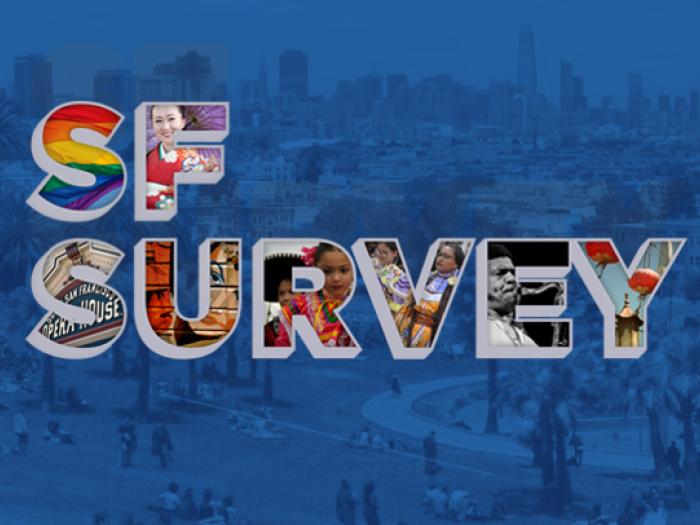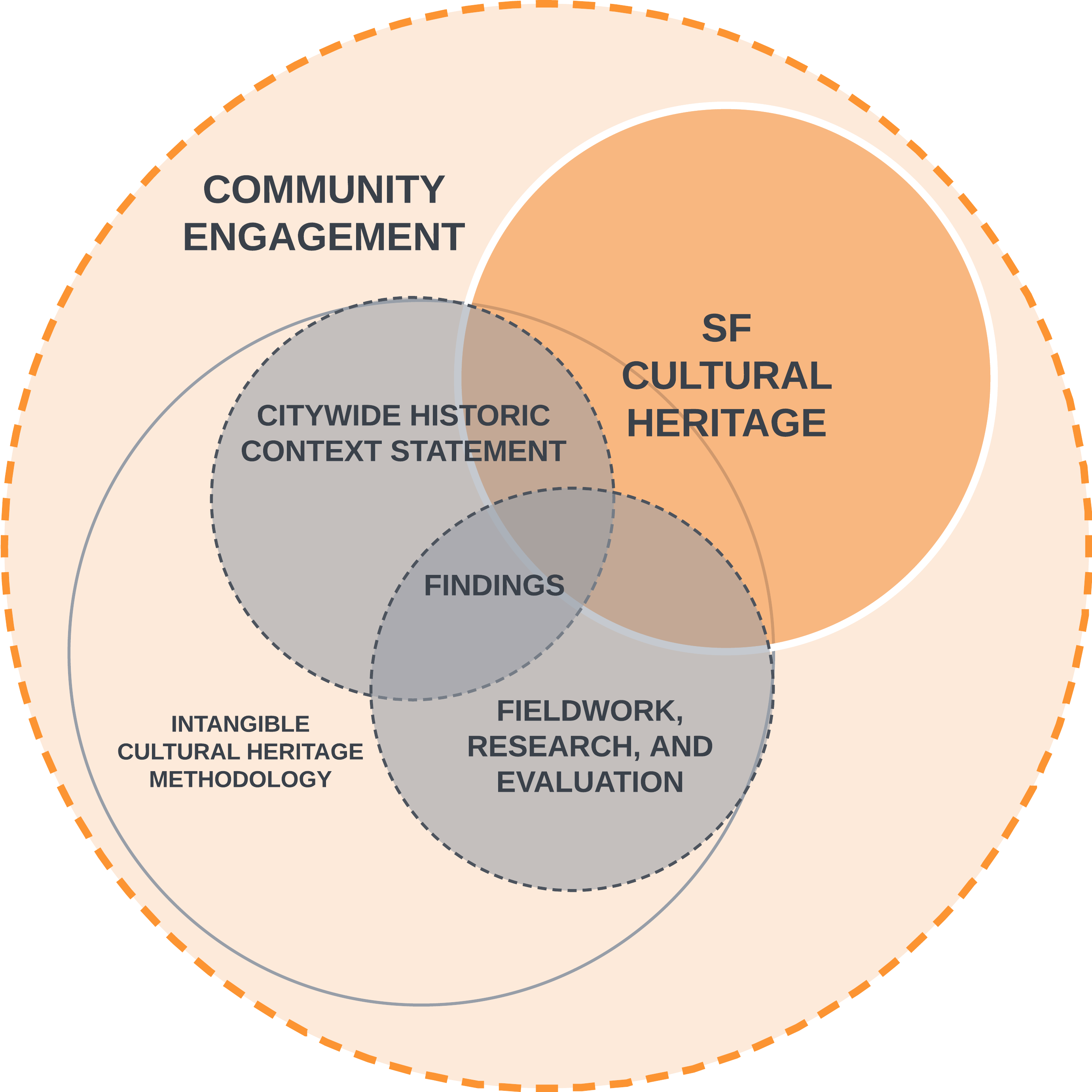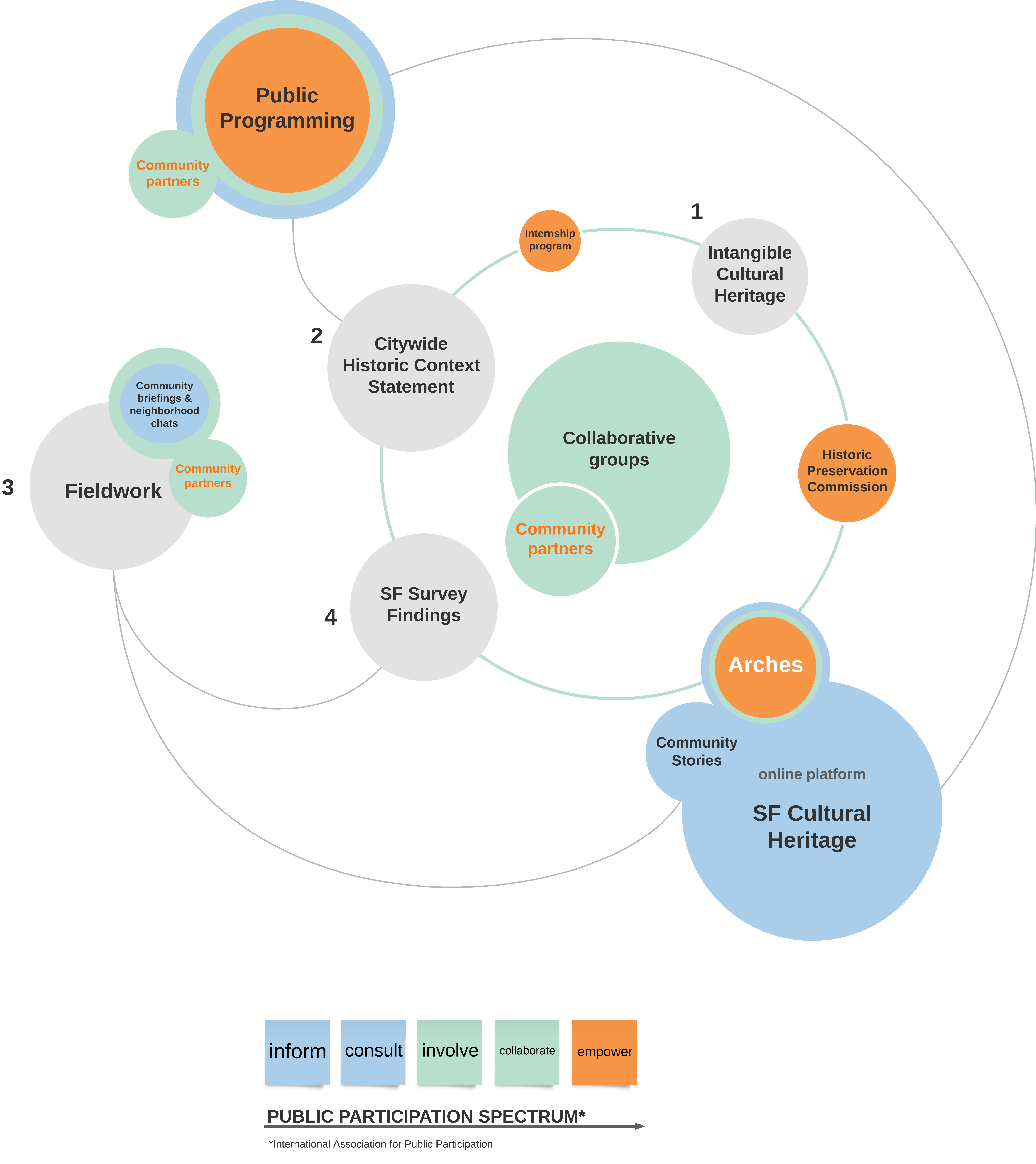
Citywide Cultural Resources Survey (SF Survey)
The San Francisco Citywide Cultural Resources Survey (SF Survey) is underway! SF Survey aims to identify places and resources of cultural, historical, and architectural importance to San Francisco's diverse communities. Cultural resources may also qualify for historic preservation incentives.
The San Francisco Citywide Cultural Resources Survey (SF Survey) is a multi-year effort supported by the San Francisco Planning Department to identify and document places and resources of cultural, historical, and architectural importance to San Francisco’s diverse communities. These places and resources include tangible aspects of our environment, such as buildings, structures, objects, sites, and districts, as well as intangible aspects, such as oral traditions, performing arts, social practices, festivals, and traditional crafts. SF Survey is taking steps to center preservation in racial and social equity, better reflecting the dynamic cultural resources that make San Francisco unique.
Purpose
Support Community-Led Cultural Empowerment
San Francisco is a culturally layered and dynamic place. The transmission of knowledge across generations brings continuity to the way of life and culture of communities. A deeper understanding of our histories and the contributions of those who came before us enhances our collective sense of belonging and agency in our communities. By cultivating community partnerships, bringing people together through community programming, and acknowledging all forms of cultural heritage, SF Survey helps contribute to sustaining San Francisco’s diverse cultures.
With a focus on inclusive representation and community-led efforts, SF Survey recognizes community and neighborhood history through the Citywide Historic Context Statement, Intangible Cultural Heritage Methodology, Community Stories, SF Survey Findings, and SF Cultural Heritage (see “Methodology” section). In collaboration with various stakeholders, SF Survey identifies sites that are eligible for the Article 10 Landmarks Work Program, Legacy Business Registry Program, California Historical Building Code, tax benefits like Mills Act, and other historic preservation protections and incentives.
Facilitate Historic Resource Review Process
SF Survey leads to a more comprehensive understanding and recognition of San Francisco's history as told through the built environment. Survey results make determinations on the historic resource status for all those parcels which have not benefited from previous survey efforts.
This includes turning properties with a Planning Department Historic Resource Status of Category B – Unknown / Age Eligible as indicated in the San Francisco Property Information Map (PIM) to either Category A - Historic Resource Present or Category C – No Historic Resource Present. As we like to say, making the unknown known. This amounts to evaluating approximately 120,000 parcels. These determinations help standardize the historic resource review process for the California Environmental Quality Act (CEQA), building permit applications, development projects, and area plans.
Methodology
SF Survey is an intensive, historic context-based cultural resources survey that will result in the identification, documentation, and evaluation of the tangible and intangible aspects of San Francisco’s cultural heritage. This effort makes evaluations in consultation with community members for properties with cultural associations.
SF Survey will be completed through five interrelated components that build off one another: Community Engagement; the Citywide Historic Context Statement; Fieldwork, Research, and Evaluation; Findings and Adoption at the Historic Preservation Commission; and the culminating online platform SF Cultural Heritage.
Many of the components of the survey will take place in tandem and will see us through the next several years.
Community Engagement
SF Survey heavily relies upon input from community members. In keeping with Planning’s previous cultural heritage based-work, the Intangible Cultural Heritage Methodology, capacity-building, and implementing a multi-media approach to engagement, critical consultation with the community is key for developing inclusive findings. Through this level of engagement, Planning ensures that aspects of the city’s history important to respective communities are shared according to the wishes of those communities.
SF Survey’s Community Engagement Framework, developed with guidance from community members and consultant in common, aligns with the Historic Preservation Commission’s racial and social equity resolution, forging civic partnerships to include and engage communities typically underrepresented in historic preservation.
Citywide Historic Context Statement
The Citywide Historic Context Statement, established in 2020, forms the foundation for fieldwork and decision-making for SF Survey. It builds upon the Department’s past historic context and survey efforts and incorporates recently completed and in-progress historic context statements. The Citywide Historic Context Statement aims to determine resource significance and rarity more accurately by examining sites thematically and on a citywide scale.
The in-progress Citywide Historic Context Statement consists of contexts, sub-contexts, and themes which are organized within three broad categories of Architectural, Cultural, and Thematic contexts. Each context statement provides an evaluative framework that establishes significance, based on the California Register and National Register criteria. Each context’s evaluative framework also provides an integrity analysis to guide future determinations, such as allowing for lower integrity if a property is associated with significant events (particularly cultures and/or cultural events) and/or persons
Learn more about completed and in-progress context statements.
Fieldwork, Research and Evaluation
Staff collect information, conduct research, and refer to the Citywide Historic Context Statement to determine California Historical Resources Status Codes for previously unevaluated, age-eligible properties across the city (45 years or older at the conclusion of the SF Survey).
The Status Codes define eligibility for listing on the California Register and National Register. Survey efforts are three-fold: pre-survey, in-field, and in-office data collection. Staff evaluate individual buildings, objects, structures, and sites, along with cultural landscapes and districts. Phasing is based on community readiness, historic context statement status, and staff capacity. In areas of the city with previously adopted historic surveys and evaluations, staff have been auditing findings to ensure accuracy and conformance with current standards.
Findings and Adoption
Surveyed properties are assigned a California Historical Resource Status Code, which is simplified into a Planning Department Historic Resource Status of either Category A - Historic Resource Present or Category C – No Historic Resource Present. The Historic Preservation Commission (HPC) holds public hearings on adoption of components of the Citywide Historic Context Statement and on adoption of draft and final survey findings for individual properties in phases throughout the life of SF Survey.
At each hearing, the HPC may elect to immediately adopt the findings with or without modifications, or they may take no action and direct the team to incorporate revisions or provide additional information. Prior to those hearings, the SF Survey Team conducts outreach to share and discuss the context statement and/or draft findings of historic resource status with the community and key stakeholders. Property-specific reports and detailed information are made available on SF Cultural Heritage.
Upon adoption of draft findings, the San Francisco Property Information Map is updated. Once the HPC adopts all portions of the Citywide Historic Context Statement and all SF Survey phases are complete, staff will prepare a final resolution to adopt all Draft SF Survey Findings as final and forward these Final SF Survey Findings to the State of California Office of Historic Preservation.
SF Cultural Heritage
SF Cultural Heritage is an online information management platform created specifically to support SF Survey efforts. This publicly accessible website highlights the interconnections of San Francisco’s cultural heritage and shares SF Survey Findings, including information gathered through community submissions and historic research.
SF Cultural Heritage is the result of a partnership between the San Francisco Planning Department and the Getty Conservation Institute, with the assistance of Farallon Geographics. It is powered by Arches, an open-source heritage data management platform developed by the Getty Conservation Institute and the World Monuments Fund. SF Cultural Heritage will interface with existing systems like the SF Property Information Map. The platform serves as San Francisco’s living cultural resources inventory, a digital resource that is accessible and interactive; the culmination of the SF Survey project. It is intended to allow for future additions and changes to the city’s cultural resources over time, as new information is aggregated.
Find out more on the components of the survey.
| Component | Schedule |
|---|---|
| Citywide Historic Context Statement | 2020 to 2026 |
| Intangible Cultural Heritage Methodology (research approach) | 2021 to 2026 |
| Fieldwork, Research, and Evaluation | 2022 to 2027 |
| Findings and Adoption | 2023 to 2027 |
| Community Engagement | 2020 to 2027 and beyond |
| SF Cultural Heritage (online platform) | 2023 and beyond |
| SF Survey Overall | 2020 to 2027 and beyond |
Timeline Diagram
Over the next several years, SF Survey will occur throughout San Francisco and primarily concentrate on previously unevaluated, age-eligible properties across the city (45 years or older at the conclusion of the SF Survey). Department staff prioritize surveying areas that have been historically underrepresented in previous Planning Department studies. Phase locations are determined based on community readiness, historic context statement status, and staff capacity. Additionally, staff have been auditing evaluations throughout the city to ensure accuracy and conformance with current standards.
Phase 1: Neighborhood Commercial Districts
With the adoption of the San Francisco Neighborhood Commercial Buildings Historic Context Statement in 2022 and considering the certification of the Housing Element with rezoning efforts along commercial corridors on the west side of the city, Phase 1 of SF Survey fieldwork, engagement, evaluations, and findings focuses on neighborhood commercial districts (NCDs). NCDs are defined by the Planning Code and Zoning Map of the City and County of San Francisco.
- Fieldwork: completed in December 2024
- Engagement: underway
- Evaluations: underway
- Findings: underway
Phase 2: Supervisorial District 4
With the adoption of relevant historic context statements including the Sunset District Residential Builders, 1925-1950 Historic Context Statement and the Housing Element rezoning effort on the west side of the city, Phase 2 of SF Survey fieldwork, engagement, evaluations, and findings focuses on the residences, schools, libraries, churches, etc. in Supervisorial District 4 (all areas outside of the already-surveyed NCDs). This includes properties in the Sunset, Parkside, and Lakeshore neighborhoods.
- Fieldwork: started in March 2025
- Engagement: underway
- Evaluations: not started
- Findings: not started
Mapping
The current SF Survey phasing map is available on the SF Property Information Map (see "Active SF Survey Areas" under the Historic Preservation section). To track progress more closely, visit SF Cultural Heritage and click on "Overlays" on the right-hand side.
The Historic Preservation Commission (HPC) holds public hearings on the adoption of historic resource findings for individual properties in phases throughout the life of SF Survey. At each hearing, the HPC may elect to immediately adopt the findings with or without modifications, or they may take no action and direct the team to incorporate revisions or provide additional information.
Prior to those hearings, the SF Survey Team conducts outreach to share and discuss the context statement and/or findings of historic resource status with the community and key stakeholders. Property-specific reports and detailed information are available on SF Cultural Heritage.
Pending adoption, the SF Survey Findings are reflected in the SF Property Information Map and used during the historic resource review process for the California Environmental Quality Act (CEQA), building permit applications, development projects, and area plans. Staff also transmit a copy of the SF Survey Findings to the California Office of Historic Preservation and to the Northwest Information Center at Sonoma State University for reference.
The Department considers the SF Survey Findings to be a "living" record and may further refine these findings to incorporate new information or address comments provided by the public, the HPC, or California Office of Historic Preservation staff.
Phase 1: Neighborhood Commercial Districts
SF Survey Findings are available for the following areas:
West of Twin Peaks, Lakeshore, and Sunnyside Neighborhood Commercial Districts
Castro, Noe Valley, and Glen Park Neighborhood Commercial Districts
- District Findings Map and Table
- Historic Preservation Commission Hearing, December 17, 2025
- Adopted Resolution R-1506 (December 2025)
- Survey Findings Executive Summary, Draft Resolution, and Community Input Tracking Report
Outer Sunset and Parkside Neighborhood Commercial Districts
- District Findings (SF Cultural Heritage website)
- Historic Preservation Commission Hearing, May 21, 2025
Richmond Neighborhood Commercial Districts
- District Findings (SF Cultural Heritage website)
- Historic Preservation Commission Hearing, February 19, 2025
Japantown Neighborhood Commercial District
- District Findings (SF Cultural Heritage website)
- Historic Preservation Commission Hearing, October 16, 2024
Upper Fillmore Neighborhood Commercial District
- District Findings (SF Cultural Heritage website)
- Historic Preservation Commission Hearing, April 17, 2024
Inner Sunset Neighborhood Commercial District
- District Findings (SF Cultural Heritage website)
- Historic Preservation Commission Hearing, December 20, 2023
Share Your Story
Everyone has a role in sharing and sustaining culture. If you see us in identifying SF Survey gear, feel welcome to come out, meet us, and share any photos or memories that you feel are important to the story of your community, neighborhood, or San Francisco. Staff will be collecting information on survey devices, or you can share by contacting staff.
Your contributions will help inform SF Survey findings and enhance our collective sense of belonging and understanding of the City's history – share your story here.
Events Calendar
For the latest information on upcoming SF Survey related events, visit our calendar.
Past Events
| Date | Event/Audience | Component | Documents |
|---|---|---|---|
| February 19, 2025 | Historic Preservation Commission Hearing | General SF Survey Update and Findings | SF Survey Findings for the Richmond Neighborhood Commercial Districts |
| May 31, 2023 | Osaka Way Open House (Tabling) | General SF Survey Update | |
| December 20, 2023 | Historic Preservation Commission Hearing | General SF Survey Update and Findings | Draft Survey Findings Executive Summary |
| December 4, 2023 | Japantown Task Force: Review Japantown workshop outcomes and community-led opportunities | General SF Survey Update and Findings | Japantown Task Force: Review Japantown workshop outcomes and community-led opportunities |
| November 15, 2023 | Housing Element Open House: County Fair Building (Tabling, Community Stories, and Draft Findings Review) | General SF Survey | Station 3: Building Stronger Communities With New Housing |
| November 8, 2023 | Housing Element Open House: SF LGBTQ Center (Tabling and Community Stories) | General SF Survey | Station 3: Building Stronger Communities With New Housing |
| September 25, 2023 | African-American Historic Context Statement Open Forum (Public Programming) | Citywide Historic Context Statement | Project webpage |
| September 18, 2023 | Japantown Task Force Japantown Workshop (Draft Findings Review) | Fieldwork and Findings | Link to Event (expired) |
| August 30, 2023 | Japantown Task Force Virtual Community Briefing (Public Programming and Informational Presentation) | Fieldwork and Findings | Recording (forthcoming) |
| August 29, 2023 | Inner Sunset Merchants Association Meeting | General SF Survey | |
| August 24, 2023 | Fillmore Merchants Association Meeting | General SF Survey | |
| August 2, 2023 | Monthly Cultural Districts Meeting | General SF Survey | |
| July 11, 2023 | Housing Element Open House: County Fair Building (Tabling and Community Stories Pilot) | General SF Survey | Station 3: Cultural Heritage & Urban Design: Integrating New Housing While Enhancing Neighborhood Environment & Culture |
| June 22, 2023 | Housing Element Open House: SF LGBTQ Center (Tabling) | General SF Survey | Station 3: Cultural Heritage & Urban Design: Integrating New Housing While Enhancing Neighborhood Environment & Culture |
| May 4, 2023 | Sunset Chinese Cultural District Work Group Meeting | General SF Survey | |
| January 18, 2023 | Historic Preservation Commission Hearing | General SF Survey | Memo to the Commission Presentation |
| January 17, 2023 | Community Walk Tour with Japantown Task Force | General SF Survey | |
| January 10, 2023 | Nihonmachi Community Coalition Meeting | General SF Survey | |
| September 21, 2022 | Historic Preservation Commission Hearing | General SF Survey Update | Memo to the Commission and 2022 SF Survey Progress Report |
| June 23, 2022 | Planning Commission Hearing | General SF Survey Update | Memo to the Commission Presentation |
| May 4, 2022 | Historic Preservation Commission Hearing | Citywide Historic Context Statement | Executive Summary to the Commission Architecture, Planning, & Preservation Professionals: A Collection of Biographies Supporting Documents |
| April 20, 2022 | Historic Preservation Commission Hearing | Community Engagement | Memo to the Commission Presentation |
| March 16, 2022 | Historic Preservation Commission Hearing | General SF Survey Update | Memo to the Commission Presentation |
| November 17, 2021 | Historic Preservation Commission Hearing | General SF Survey Update | Memo to the Commission Presentation |
| November 17, 2021 | Historic Preservation Commission Hearing | Citywide Historic Context Statement | Memo to the Commission Earthquake Shacks Theme Presentation |
| April 7, 2021 | Historic Preservation Commission Hearing | Citywide Historic Context Statement | Memo to the Commission Residence Parks Supporting Presentation |
| April 7, 2021 | Historic Preservation Commission Hearing | General SF Survey Update | Memo to the Commission Presentation |
| November 18, 2020 | Historic Preservation Commission Hearing | General SF Survey Update | Memo to the Commission Presentation |
Get in touch by emailing CPC.Survey@sfgov.org or leaving a voicemail at (628) 652-7573.
RECIEVE UPDATES
Sign up to receive news from the SF Survey project. This may include newsletters, events, and updates when there is important news to share. You may unsubscribe at any time.



